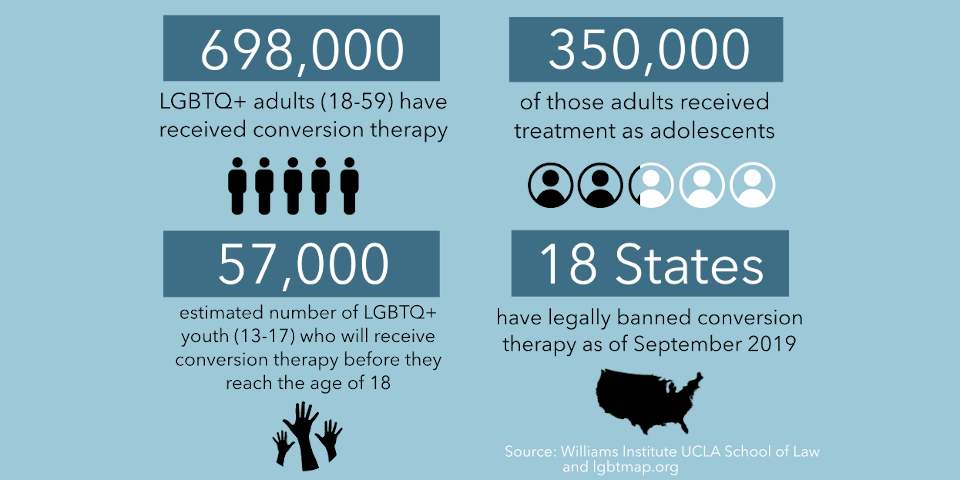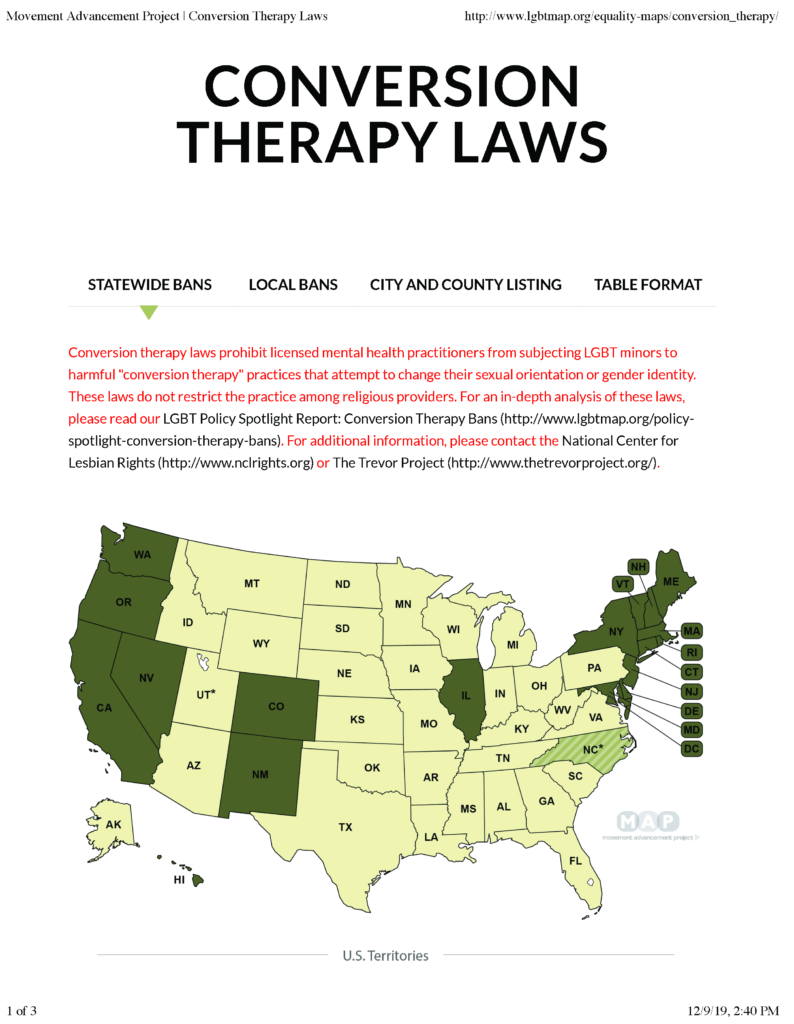A Legislative Dead End
Discredited by every mainstream mental health and medical organization in the nation, so-called conversion therapy has long been condemned as not only ineffective but harmful. There is little point in engaging in debate as to the efficacy of the practice, just as reputable media outlets have ceased allowing airtime and column inches to those who would deny the existence of climate change. Beginning with California's ban in 2012, conversion therapy has been outlawed in 18 states and the District of Columbia as well as numerous counties and cities: Huntington Woods, East Lansing, Ferndale and Berkley among them. However, conversion therapy, the pseudoscientific treatment in which a counselor or coach of some kind attempts to change an individual's sexual orientation or gender identity, remains legal in the state of Michigan.
Numerous attempts to ban conversion therapy have been made by state legislators. Former Rep. Adam Zemke (D-Ann Arbor) introduced legislation in 2014, 2016 and 2018; Sen. Mallory McMorrow (D-Royal Oak) and Rep. Yousef Rabhi (D-Ann Arbor) followed suit this April. The current bills would amend Michigan's mental health code to prohibit a mental health professional from engaging in conversion therapy with a minor. Violating the law would result in "disciplinary action and licensing sanctions for unprofessional conduct."
The current bills, as was the case with previous ones, will almost certainly not get a committee hearing, much less a full floor vote, while Republicans hold the majority.
 The Promise of Litigation
The Promise of Litigation
Because attempts to end conversion therapy through legislation have as yet reached a dead end, litigation could be another strategy to tackle it in Michigan — though admittedly it would not ban the practice outright. Those harmed by conversion therapy may have a viable claim to make with the Consumer Protection Division. Because it amounts to "sham" medicine, a practitioner or business could be in violation of the Michigan Consumer Protection Act. Consumer fraud lawsuits need only prove the "product" doesn't work as advertised, not that it is unethical. Further, the targets of this tactic would not be limited to licensed therapists. And a claim could be made on behalf of any victim: minor or adult. By the same token, conversion therapy businesses could be sued merely for advertising their false claims.
In response to a recent email inquiry, the Michigan Consumer Protection Division replied that conversion therapy may violate one or more provisions of MCL 445.903, depending on exactly what they are doing and how it is being marketed:
• Causing a probability of confusion or misunderstanding as to the source, sponsorship, approval, or certification of the services. (1)(a)
• Representing that a service has certain benefits or qualities that it doesn't have. (1)(c)
• Failing to reveal a material fact, the omission of which tends to mislead or deceive the consumer, and the fact could not be reasonably be known by the consumer. (1)(s)
• Making a representation of fact or statement of fact material to the transaction such that a person reasonably believed the represented or suggested state of affairs to be other than it actually is. (1)(bb)
• Failing to reveal facts that are material to the transaction in light of representations of fact made in a positive manner. (1)(cc)
Consumer fraud lawsuits against conversion therapy have been tried with success in other states: one in New Jersey and another in California in which a settlement was reached.
A Legal Expert Weighs In
Jay Kaplan, staff attorney for the ACLU of Michigan, agrees that conversion therapy could amount to consumer fraud.
"I certainly think if they're taking money from people for a service … with the expectation that they're going to get the results that have been promised, I think that is something involving consumers and consumer protection, particularly if what they're saying is false," Kaplan said.
"What this really is — people are, organizations are entitled to commercial speech, but that commercial speech can't be false. And particularly if you're alleging specific results from your conversion therapy program, that … can't be scientifically verified, or making certain types of verbal guarantees without being able to back that up, it's problematic."
Lately, however, anti-LGBTQ groups have argued that LGBTQ rights amount to an infringement of their own civil liberties. A situation arose in New York City in September where, much to their regret, city council felt compelled to repeal their ban on conversion therapy because the Alliance Defending Freedom threatened to sue: they claimed the ban violated their freedom of religion and freedom of speech. Because the Alliance has a history of its cases being elevated to the U.S. Supreme Court, which has a conservative majority, and due to the U.S. Court of Appeals for the 2nd District also having been stacked with conservative judges under the current presidential administration, the council made what they called a "painful" decision. An unfavorable SCOTUS ruling could put every ban in the country at risk. Fortunately, the citywide ban had largely duplicated the statewide one so city residents remain protected.
"There will be arguments that one does have freedom of speech to offer their opinions about things including what it means to be LGBT and whether or not they have an opinion that one's sexual orientation or one's gender identity could be changed," Kaplan stated. He also felt houses of worship could claim it is part of their overall religious program and that separation of church and state should prevent the government from intervening.
Still, "Some of these groups might be affiliated with a faith-based organization and if they are advertising outside of their institution itself and looking for customers to utilize these services, I think that still ties it to it," Kaplan continued. "No doubt, if a complaint is filed, some of these groups will allege they are being targeted because of their religious beliefs."
 Where to Go from Here
Where to Go from Here
Kaplan believes states are on stronger ground when they're dealing with licensing.
"If you're engaging in a type of practice that's thoroughly debunked and discredited by experts, that should have an impact on your license," he said.
Currently, bans in four states allow for licensing discipline in addition to enforcement and penalties consistent with their state laws against unfair business practices. Not only that, the Therapeutic Fraud Prevention Act, federal legislation introduced in 2015 and 2017, would classify conversion therapy provided in exchange for payment as a form of consumer fraud. State attorneys general and the Federal Trade Commission could bring enforcement actions against practitioners. Bottom line, the government should be expected to have an interest in protecting the public's pocketbooks, if not their psyches.
"While we're waiting for the legislature to do something on this. … filing complaints would help make the case about why this needs to be more comprehensively dealt with," Kaplan concluded. "I think this is something the ACLU would be interested in if there was clearly information about a particular conversion therapy program doing false advertising and making false claims."
Nearly two years ago, there was tremendous outcry in the LGBTQ community when it was discovered that a local church was engaging in conversion therapy with minors. At that time, Reps. Zemke and Camilleri sent a letter to then-Attorney General Bill Schuette urging him to investigate whether FORGE Ministries and Metro City Church committed any "unfair, unconscionable or deceptive practices," and to work with federal authorities to look into possible violations of the Federal Trade Commission Act. A response from the Republican AG's office was not forthcoming.
If a consumer believes a violation of the Michigan Consumer Protection Act has been made, they should file a complaint with the Attorney General's office: mi.gov/agcomplaints or 877-765-8388. To submit a legal complaint to the ACLU of Michigan: action.aclu.org/legal-intake/submit-complaint-aclu-michigan










